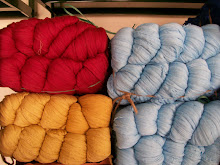Like several thousand other climate-change warriors/worriers, I spent my Saturday marching across London calling on the British government to take a tough stance on greenhouse gas emissions at the Copenhagen Summit this week.

Despite the severity of our planet's situation, it has to be said that Saturday's march was a very sociable affair. Amongst others, I met Katie who was proudly marching in a Bishopston Trading classic embroidered jacket.
 This got me thinking about what we already do as a company to reduce our ecological footprint and also what else we could do....
This got me thinking about what we already do as a company to reduce our ecological footprint and also what else we could do....
Here's are 4 things we're good at:
Starting right at the beginning, the cotton we use is 100% organic, sourced from Agrocel Pure & Fair Cotton Growers in Gujurat. Conventionally grown cotton is enormously chemically intensive: some people estimate 25% of the world's insecticides are used on cotton alone, and 10% of the world's pesticides too. Most of these chemicals are derived from oil. Organic cotton farming cuts this out of the picture straight away.
Next comes the cotton weaving. As I've mentioned at least once before here, Bishopston Trading Company works with local based handloom weavers in K.V.Kuppam, who produce the handloom cloth which we use in the majority of our products. Handloom weaving is a traditional craft that relies on no energy source other than the pulling and pedalling action of the weaver. Our felllow Fair-Traders People Tree claim that fabric woven on a handloom produces 1 tonne less CO2 per year than the equivalent cloth from a powerloom.
Now to production. Since the earliest days, Bishopston Trading Company and our partners in K.V.Kuppam, have produced all sorts of bags, accessories, toys and gifts. Not only do our customers love them, especially at this time of year, but they ensure that every last scap of cloth is used up after our clothing collections have been produced. The K.V.Kuppam Tailoring Societies are waste-free producers!
Finally, in terms of the business at the UK end. There's several things that would be worth mentioning, for example the electricity company we use, where we buy our supplies of tea bags, toilet cleaner, soap etc. But probably the most interesting thing we do, concerns how we dispose of some of our packaging waste. Our goods arrive in cardboard boxes (of course these are then recycled) which are wrapped in cotton cloth to ensure the contents are safe and the boxes last the long voyage to Britain. We then donate this cloth to various local organisations who use it in their various projects: our friend Kath uses it to make rag-rugs which she sells locally to generate funds for her charity work in Gambia, local ethical-entrepreneur Rachel uses it in her reusable sanitary towels, and finally the local scrap-store offers it as craft material to local youth groups.
Next time: where we need to improve...
In the meantime, check our these blogs by local campaigners, Valerie and Janine who are reporting from Copenhagen as the negotiations take place.


No comments:
Post a Comment